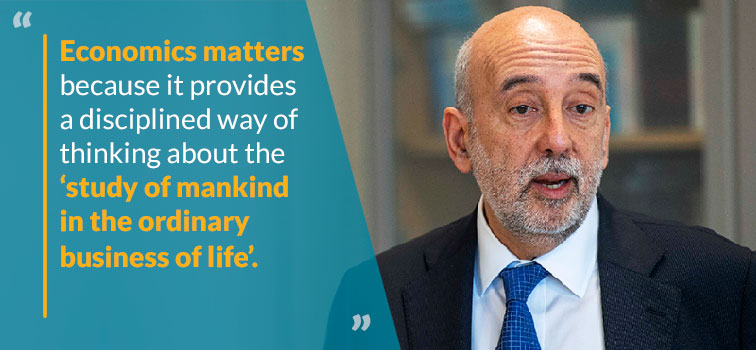A Letter to Students of Economics – 2021
21 October 2021
Blog
 Dear Student,
Dear Student,
Since starting the academic year, you’ll likely have been reading and hearing about the economic recovery as we emerge from the pandemic, about the post-pandemic economy itself and how it might (or might not) change, about inflation, supply chains and bottle-necks, about climate change and the transition to net zero carbon emissions and about many other issues that affect the way we live, work and play in Ireland and around the world. All these issues matter to the community, and many will be of interest to your family and your friends who, because you are a student of economics, will be asking for your insights and explanations as to what is going on. Have you thought of your answers to those questions, and a likely follow-up: what is an “economist”?
As I wrote last year in my letter to students of economics, I like to think about the role of economists as “weavers”, people who bring together different strands of evidence and analytical frameworks and weave them into baskets to carry forward public policy and find solutions to today’s and tomorrow’s challenges. Economics matters because it provides a disciplined way of thinking about the “study of mankind in the ordinary business of life”. But the ordinary business of life is constantly changing so we must always look for new ways, new tools and new policies to understand and tackle the new challenges that face us.
Economists have important roles to play in central banks to ensure our policy decisions are based on sound evidence and analysis. One very clear example of this over the past year has been the work done across the euro area on the European Central Bank’s (ECB) strategy review, the first review in 18 years.
The aim of the review was to make sure our monetary policy strategy was fit for purpose, both today and in the future. We had to assess a wide variety of topics such as the measurement of inflation, how to formulate our price stability objective, which monetary policy instruments we should use, the role of “expectations” and how best to communicate our decisions. The work included analysing the models we use to inform forecasting and policy analysis, studying the impact of financial stability on monetary policy and deepening our understanding of the interactions between monetary and fiscal policy. And, inevitably, we also looked at the effects of digitalisation, and how innovation, technological progress and productivity affect the way our economy works, and the implications of climate change for our monetary policy. People from across the euro area completed a huge amount of work (on these and other topics) to support the review. The ECB published the relevant papers last month (and I am very proud of the contribution made by colleagues in the Central Bank of Ireland, including leadership roles on two of the 12 workstreams informing the review).
The ECB’s review is an excellent example of economics in action, helping policymakers as we look for ways to increase the wellbeing of communities across Europe and Ireland. It also reflects some of the “principles that I see as important for economists. For example, our economists needed to understand and incorporate the perspectives that other disciplines can bring to inform our thinking. We worked to consider the wide diversity of thought on issues relevant to our review and to understand the history of how we arrived at today’s world.
I hope you enjoy your time on campus this year. At some point, you’ll start to think about your future career options and I encourage you to think of the Central Bank of Ireland. Our Graduate Programme is open for applications until 2 November. We welcome applications from all graduates, (and not just those with an economics background). Graduates have the opportunity to gain valuable work experience at the heart of the Irish financial sector as well as do impactful work that makes a difference to the community.
The Central Bank’s mission is to serve the public interest by maintaining monetary and financial stability while ensuring that the financial system operates in the best interests of consumers and the wider economy. If that resonates with you, as it does with me, you will find the Central Bank of Ireland a very fulfilling place to work.
Gabriel Makhlouf
Read more:
The Euro area outlook